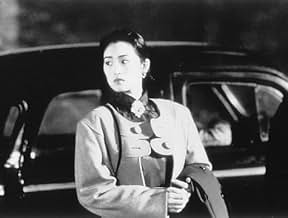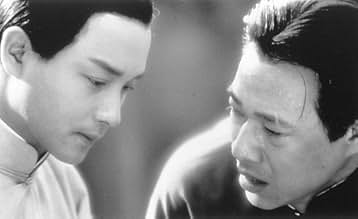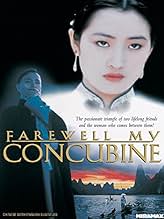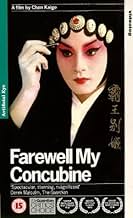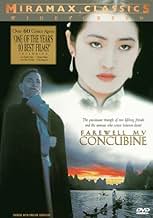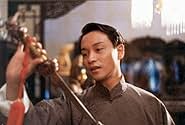IMDb रेटिंग
8.1/10
36 हज़ार
आपकी रेटिंग
दो लड़के, 1924 में, पेकिंग के एक ओपेरा ट्रेनिंग स्कूल में मिलते हैं. उनके बीच हुई दोस्ती लगभग 70 वर्षों तक चलेगी और चीन के इतिहास के सबसे अधिक परेशानी वाले समय की गवाह बनेगी.दो लड़के, 1924 में, पेकिंग के एक ओपेरा ट्रेनिंग स्कूल में मिलते हैं. उनके बीच हुई दोस्ती लगभग 70 वर्षों तक चलेगी और चीन के इतिहास के सबसे अधिक परेशानी वाले समय की गवाह बनेगी.दो लड़के, 1924 में, पेकिंग के एक ओपेरा ट्रेनिंग स्कूल में मिलते हैं. उनके बीच हुई दोस्ती लगभग 70 वर्षों तक चलेगी और चीन के इतिहास के सबसे अधिक परेशानी वाले समय की गवाह बनेगी.
- 2 ऑस्कर के लिए नामांकित
- 24 जीत और कुल 12 नामांकन
Zhenxiang Fei
- Shitou as a Child
- (as Yang Fei)
फ़ीचर्ड समीक्षाएं
The film paints the story of two actors, from their first encounter at school in the Twenties through their success as stars of the Peking Opera, difficulties during the Japanese occupation, the Communist takeover in 1949 and the traumas of the Cultural Revolution in the Sixties
For the so-called Fifth Generation of Chinese filmmakers, the film touches new ground on two fronts In the first place, though it does not avoid from acknowledging the sufferings under the old regime, it takes an embittered view of Communist society and of the Cultural Revolution specifically
The two friends, Xiaolou and Dieyi, adopt a young man, Xiao Si, who becomes one of the Red Guards and quickly informs the political sins of his benefactors
Second the film is a love story of a rare kind Dieyi is a homosexual and suffers rejection when Xiaolou begins an affair with Juxian (Gong Li), a gorgeous prostitute The personal conflict of each character is the heart of this exceptional movie
For the so-called Fifth Generation of Chinese filmmakers, the film touches new ground on two fronts In the first place, though it does not avoid from acknowledging the sufferings under the old regime, it takes an embittered view of Communist society and of the Cultural Revolution specifically
The two friends, Xiaolou and Dieyi, adopt a young man, Xiao Si, who becomes one of the Red Guards and quickly informs the political sins of his benefactors
Second the film is a love story of a rare kind Dieyi is a homosexual and suffers rejection when Xiaolou begins an affair with Juxian (Gong Li), a gorgeous prostitute The personal conflict of each character is the heart of this exceptional movie
I have had a great deal of trouble writing this review. Every time I make a start I can find nothing to get my teeth into and no coherent thread to interconnect my thoughts. While there are many potential sub-topics they all seem to stand in isolation. While this may simply be a reflection of my inability to string two sentences together I think in this case it pretty accurately summarizes the issues I have with this movie.
It is difficult to figure out what this movie is and if asked to summarise it in 25 words or less I would be flummoxed. Is it a Chinese history movie? An opera movie? A Chinese culture lesson? A love story? A story of betrayal? A story of pseudo or actual homosexuality? It is snippets of all of these and probably more, but it does not really do justice to any of them. Basically it suffers from multiple personality disorder and unfortunately we don't get enough time with any of them to relate to any of them. Yes, the history and cultural aspects are interesting in their way but don't really add anything to our understanding of the horrors of the Japanese invasion of China, the Nationalist/Communist struggle, the early Communist era and the later Cultural Revolution. Yes, it is a "love story" between the two actors who play the King and the Concubine, but we never experience any passion or come anywhere close to connecting to either of these characters to really care. The "King" character in particular is very undeveloped, little more than a cardboard cut-out who happens to be the object of the "Concubine's" unrequited love. The character played by Gong Li is also skin deep and we never really care about her or her relationship with the "King" actor – indeed the random and non-sensical way in which these two characters become engaged simply nukes any credibility that this relationship might have had, and by extension destroys the credibility of any other relationship on the movie, most importantly the pivotal one between the "King" and the "Concubine". The betrayal, which I gather meant something personal to the director, is dealt with too curtly to have any effect at all. The character of the "son", raised from an abandoned baby, is totally illogical and we simply don't get to know him well enough to care about him or understand why he would possibly want to betray his adoptive parents. It all just seems facile and silly. We never really understand (or at least, I don't) the "homosexual" overtones of the "Concubine". Was he simply beaten into a form of insanity in which he thinks he is always in character as a woman? Is he actually a homosexual? His "king" friend seems to be too thick to understand the "Concubine's" feelings for him and this to me trivializes the whole "affair". And to be honest, none of the characters come across as being particularly nice, in fact the Concubine character comes across more as a petty, whinny, jealous, lightweight flake than a tragic figure we could weep for.
OK, just because a film is not perfect doesn't mean you should not watch it. "Farewell My Concubine" is one of those films which is a "must see" despite its failings. If it falters as an emotionally satisfying and coherent movie it is a stunning technical tour de force and a masterpiece of its kind. Just to have made a movie of this scope is an achievement, almost to the point that its success is secondary, crazy as that may sound. It is a movie of such breadth that it is impossible to take in completely in one sitting, and that is perhaps the ultimate test – you know you need to see it again to understand it but can you care enough about it to make that effort? But – trust me - you need to see this movie – your education as a movie goer is incomplete unless you do. You will enjoy it, and you will be moved to have an opinion, one way or the other.
It is difficult to figure out what this movie is and if asked to summarise it in 25 words or less I would be flummoxed. Is it a Chinese history movie? An opera movie? A Chinese culture lesson? A love story? A story of betrayal? A story of pseudo or actual homosexuality? It is snippets of all of these and probably more, but it does not really do justice to any of them. Basically it suffers from multiple personality disorder and unfortunately we don't get enough time with any of them to relate to any of them. Yes, the history and cultural aspects are interesting in their way but don't really add anything to our understanding of the horrors of the Japanese invasion of China, the Nationalist/Communist struggle, the early Communist era and the later Cultural Revolution. Yes, it is a "love story" between the two actors who play the King and the Concubine, but we never experience any passion or come anywhere close to connecting to either of these characters to really care. The "King" character in particular is very undeveloped, little more than a cardboard cut-out who happens to be the object of the "Concubine's" unrequited love. The character played by Gong Li is also skin deep and we never really care about her or her relationship with the "King" actor – indeed the random and non-sensical way in which these two characters become engaged simply nukes any credibility that this relationship might have had, and by extension destroys the credibility of any other relationship on the movie, most importantly the pivotal one between the "King" and the "Concubine". The betrayal, which I gather meant something personal to the director, is dealt with too curtly to have any effect at all. The character of the "son", raised from an abandoned baby, is totally illogical and we simply don't get to know him well enough to care about him or understand why he would possibly want to betray his adoptive parents. It all just seems facile and silly. We never really understand (or at least, I don't) the "homosexual" overtones of the "Concubine". Was he simply beaten into a form of insanity in which he thinks he is always in character as a woman? Is he actually a homosexual? His "king" friend seems to be too thick to understand the "Concubine's" feelings for him and this to me trivializes the whole "affair". And to be honest, none of the characters come across as being particularly nice, in fact the Concubine character comes across more as a petty, whinny, jealous, lightweight flake than a tragic figure we could weep for.
OK, just because a film is not perfect doesn't mean you should not watch it. "Farewell My Concubine" is one of those films which is a "must see" despite its failings. If it falters as an emotionally satisfying and coherent movie it is a stunning technical tour de force and a masterpiece of its kind. Just to have made a movie of this scope is an achievement, almost to the point that its success is secondary, crazy as that may sound. It is a movie of such breadth that it is impossible to take in completely in one sitting, and that is perhaps the ultimate test – you know you need to see it again to understand it but can you care enough about it to make that effort? But – trust me - you need to see this movie – your education as a movie goer is incomplete unless you do. You will enjoy it, and you will be moved to have an opinion, one way or the other.
I finally got a chance to see "Farewell my Concubine." I'd been anxious to see it since its initial release in 1993. It surprised me in its depth and technical skill.
Three points make this film outstanding. The first is the technical skill of the director and the luscious taste of the director of photography. The entire film is a feast for the eyes, taking full advantage of elaborate costumes and exotic locations. The second strength is in the actual storytelling. The plot is a fascinating tragedy, it feels almost Shakespearean. The acting is nothing short of incredible. Some of China's finest actors demonstrate their ability to carry a story that covers 52 years. Normally, these two strengths alone would be reason enough to see a film, but "Farewell my Concubine" succeeds in satisfying one more category (the bain of any epic): historical accuracy.
"Farewell my Concubine" is exceptionally accurate in portraying the monumental changes that were sweeping China at the time. The film doesn't just treat these events as background events, but drags them right into the plot and pins the characters into their surroundings. This is interesting when you consider that the story takes place in the Peking Opera, not the most likely place for these events to have effect. Instead, as we see the new China emerge, we watch these vestiges of old society fall, and the work of all involved make this transition an achievement to behold. The power of this film was not missed by Chinese censors who banned, removed, and then banned the film again several times over -debating whether or not its artistic brilliance was worth subversive portrayals of suicide and homosexuality. Unlike "The Last Emperor," this film was made by Chinese film makers and is in tune with its subject. I recommend this film highly!
As one last note, the version I saw was a DVD containing the original 170 minute version of the film, in its wide-screen splendor. From what I understand, the shorter versions released internationally deleted and shortened some opera scenes for fear that they would be lost on Western audiences. Having no prior experience with any Peking Opera, I found the scenes fascinating and integral to appreciating the entire story. Spend the extra time if you can.
Three points make this film outstanding. The first is the technical skill of the director and the luscious taste of the director of photography. The entire film is a feast for the eyes, taking full advantage of elaborate costumes and exotic locations. The second strength is in the actual storytelling. The plot is a fascinating tragedy, it feels almost Shakespearean. The acting is nothing short of incredible. Some of China's finest actors demonstrate their ability to carry a story that covers 52 years. Normally, these two strengths alone would be reason enough to see a film, but "Farewell my Concubine" succeeds in satisfying one more category (the bain of any epic): historical accuracy.
"Farewell my Concubine" is exceptionally accurate in portraying the monumental changes that were sweeping China at the time. The film doesn't just treat these events as background events, but drags them right into the plot and pins the characters into their surroundings. This is interesting when you consider that the story takes place in the Peking Opera, not the most likely place for these events to have effect. Instead, as we see the new China emerge, we watch these vestiges of old society fall, and the work of all involved make this transition an achievement to behold. The power of this film was not missed by Chinese censors who banned, removed, and then banned the film again several times over -debating whether or not its artistic brilliance was worth subversive portrayals of suicide and homosexuality. Unlike "The Last Emperor," this film was made by Chinese film makers and is in tune with its subject. I recommend this film highly!
As one last note, the version I saw was a DVD containing the original 170 minute version of the film, in its wide-screen splendor. From what I understand, the shorter versions released internationally deleted and shortened some opera scenes for fear that they would be lost on Western audiences. Having no prior experience with any Peking Opera, I found the scenes fascinating and integral to appreciating the entire story. Spend the extra time if you can.
This is, without the doubt, the very best of Chinese film making, acting and story telling. I didn't watch this movie only until last year, and there are no words were powerful enough to express my feelings. The acting were flawless, and the emotion in the entire film were so real and strong, you'll feel so attached the whole time. Leslie is the one and only actor who can fully deliver the role of ChengDieYi, and his work in this film is remarkable. A true milestone performance of his career and film acting. The story, The history, The culture, The acting!!!
A must see film!!!
A must see film!!!
A masterpiece in every sense of the word, Chen Kaige's breath-stealing parable of China's multi-layered political revolution, is centred on two men. Chen presents us with an absorbing story of a 52 year-old relationship between two opera actors mounted upon an impossibly large canvas. But without sacrificing any intricate plot development or smudging over any delicate complexity in the relationship.
Considered by many to be one of the greatest epics of all time, this film rightly established Chen's reputation as one of the most brilliant narrative and artistic directors of our time, along with other such contemporary auteurs as Kieslowski, Bertolucci and Kurosawa.
You can not call yourself a film-buff if you haven't seen this movie. And film-students: you can witness the true art of filmmaking and story telling through the skilled hands of Chen Kaige's Farewell My Concubine.
Considered by many to be one of the greatest epics of all time, this film rightly established Chen's reputation as one of the most brilliant narrative and artistic directors of our time, along with other such contemporary auteurs as Kieslowski, Bertolucci and Kurosawa.
You can not call yourself a film-buff if you haven't seen this movie. And film-students: you can witness the true art of filmmaking and story telling through the skilled hands of Chen Kaige's Farewell My Concubine.
क्या आपको पता है
- ट्रिवियाJackie Chan was originally offered the role of Duan Xiaolou due to his own childhood experience of training in the Peking Opera. But he turned it down, fearing that the film, which deals with themes of homosexuality, might tarnish his image.
- गूफ़When Douzi is first examined by the owner of the opera troupe, his extra finger is on his right hand below the thumb. When he withdraws the hand from the opera troupe owner, he pulls back his left arm. When his mother cuts the extra finger off a few moments later, it is now on his left hand, next to his pinkie.
- भाव
Master Yuan: A smile ushers in the spring.
Master Yuan: A tear does darken all the world.
Master Yuan: How truly does this befit you. To you... only you are possessed of such charm.
- इसके अलावा अन्य वर्जनThe version presented in the U.S. is different from the original, longer cut, that was distributed internationally. The following differences exist in the U.S. version:
- The scene where Duan and Juxian are drinking after their wedding was originally directly after the wedding scene, rather than after the bloodletting at the Yuan-Cheng dinner.
टॉप पसंद
रेटिंग देने के लिए साइन-इन करें और वैयक्तिकृत सुझावों के लिए वॉचलिस्ट करें
- How long is Farewell My Concubine?Alexa द्वारा संचालित
विवरण
बॉक्स ऑफ़िस
- बजट
- $40,00,000(अनुमानित)
- US और कनाडा में सकल
- $55,49,086
- US और कनाडा में पहले सप्ताह में कुल कमाई
- $69,408
- 17 अक्टू॰ 1993
- दुनिया भर में सकल
- $74,37,725
- चलने की अवधि
- 2 घं 51 मि(171 min)
- रंग
- ध्वनि मिश्रण
- पक्ष अनुपात
- 1.85 : 1
इस पेज में योगदान दें
किसी बदलाव का सुझाव दें या अनुपलब्ध कॉन्टेंट जोड़ें


